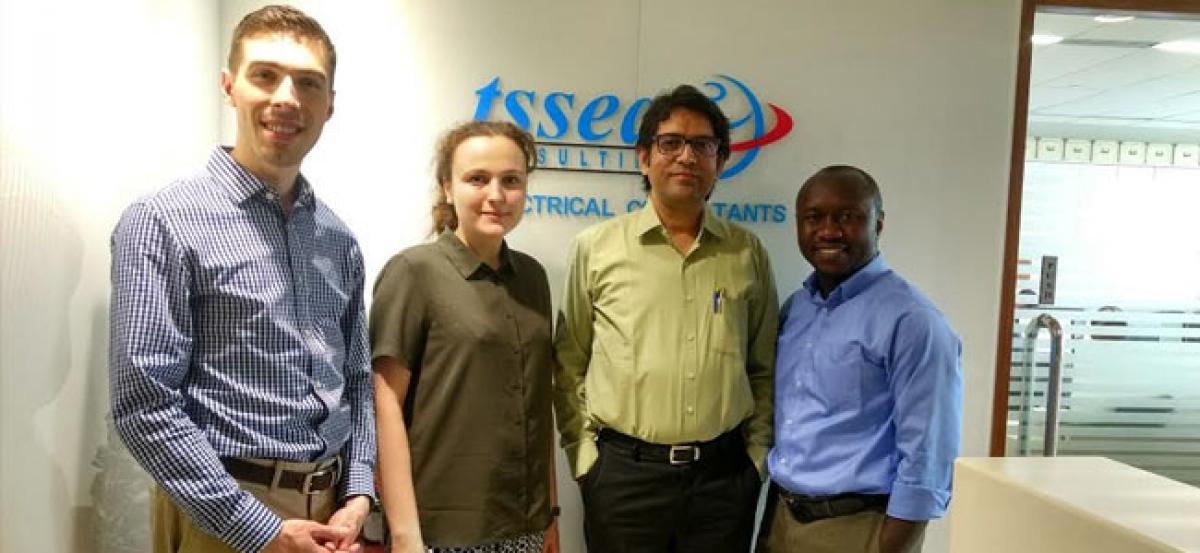Live
- Punjab DGP, MHA official request farmer leader Dallewal to end 20-day fast
- Stage Collapse During Swearing-In Ceremony of KUDA chairman in Kakinada
- Govt unveils ‘Jalvahak’ to boost inland waterways
- List of criminals: Delhi BJP chief on AAP panel of 38 candidates
- PSBs in India clock record Rs 1.41 lakh crore in net profit in FY24
- Telangana Government Announces Key Development Plans: Bhatti Vikramarka
- Crackdown on illegal poppy farming in Manipur: Assam Rifles destroyed 6,228 acres in 5 years
- South Korea's ruling party leader cancels press conference amid calls for resignation
- AIADMK's big meet discusses 2026 polls, prospective alliances
- BJP questions Congress-Shiv Sena (UBT) alliance over Aaditya Thackeray's Savarkar-Nehru remark
Just In
Vatika Group becomes Field Global Partner for Harvard Business School


Real estate firm Vatika Group recently had the opportunity to host a team of students from Harvard Business School in Gurugram for one week as part of a required first-year course
Gurugram: Real estate firm Vatika Group recently had the opportunity to host a team of students from Harvard Business School in Gurugram for one week as part of a required first-year course at Harvard Business School called the FIELD Global Immersion. The course is designed to provide an immersive and hands-experience to students by undergoing real fieldwork on an innovative project. In Gurugram, the students were tasked with exploring ways to improve waste management process in Vatika Group’s developments. Vatika Group was one of 157 FIELD Global Partners spanning 14 countries around the world. Together these Global Partners combined to host more than 930 Harvard Business School students in all.
Speaking of the collaboration, Juan Alcacer, Professor, Faculty head of FIELD at HBS said, “We are extremely grateful to the VATIKA GROUP and all the FIELD Global Partner organizations for all they do on behalf of our students who benefit immeasurably from this experience and we hope the partner organizations do as well.”
Solid waste segregation is one of the biggest challenges faced by urban areas and metropolitan cities. According to a report from Delhi Development Authority, the city of Delhi alone produces 25,000 tons of waste every day. With government regulations around recycling likely to be enforced in the future, Vatika Group recognizes that they have an opportunity to lead the recycling movement in India, a country which produces large volumes of domestic waste.
In an attempt to study the ‘Waste Segregation solutions for a sustainable future’, the HBS team utilized customer behaviour analysis and design thinking frame work problem to address Vatika’s sustainability concerns. During their stay here, the students conducted field research with consumers around Gurugram, pitched ideas to the leadership team and presented their final recommendations to the Vatika management.
Enviro which is Vatika’s facilities management division engaged with the students to glean insights into the solid waste ecosystem and look for adequate ways to encourage sustainable living.
“We are pleased to be working with Harvard Business School to provide students with a real-world learning experience in India. We feel certain that the students were able to gather insights here that they would never be able to glean from a classroom discussion alone.” said Alok Mehta, Vice President, Product Strategy, Vatika Ltd.
The HBS students interviewed several professionals with varying industry, age, and experience to capture a range of consumer behaviours in office settings. The team used five criteria to evaluate potential solutions- their effect throughout the value chain, simplicity, cost, effectiveness, and feasibility.
1. Bin initiative: The distinct dry and wet bins placed as per employee differentiation.
2. Education Initiative: The Instructional video and posters placed in highly visibleareas.
3. Sustainability Board: The representatives from Landlord and tenantto form a board to circulate sustainability requirements and share the best practices among one another.
4. Enforcement: Sustainability rules can be included in new lease contracts. Office housekeeping staff would be provided with “reminder cards” to be left on the desks of workers.
5. Vendor Management: Vatika and Enviro should explore partnerships with trash collectors and MCG to increase engagement and accountability.

© 2024 Hyderabad Media House Limited/The Hans India. All rights reserved. Powered by hocalwire.com






